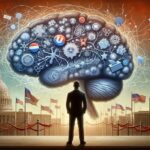Politics plays a crucial role in our lives, shaping the policies and decisions that impact our communities, countries, and the world at large. Whether we realize it or not, our political decisions are heavily influenced by a complex interplay of psychological factors. In this article, we will delve into the psychology of political decision-making, exploring the various elements that shape our choices and the implications they have on society.
Introduction
Political decision-making is not a purely rational process. While we like to think that we make decisions based on facts, figures, and a thorough analysis of policy proposals, our choices are often driven by a mix of emotions, biases, and cognitive shortcuts. Understanding the psychological underpinnings of political decision-making is essential for policymakers, political strategists, and citizens alike.
Partisanship and Identity
The Role of Partisanship
One of the most significant psychological factors influencing political decisions is partisanship. Partisanship refers to the strong attachment and loyalty people feel toward a particular political party or ideology. This loyalty can be so strong that it often trumps other considerations, such as the specific policy proposals of a candidate.
Research has shown that individuals tend to support and defend their chosen political party, even when confronted with evidence that contradicts their beliefs. This phenomenon, known as “motivated reasoning,” leads people to interpret information in a way that confirms their preexisting beliefs and political identity.
Identity Politics
Identity politics is another crucial aspect of political decision-making. People often align themselves with a political group or ideology that reflects their social, cultural, or personal identity. These identities can be based on factors such as race, religion, gender, sexual orientation, and socioeconomic status.
When individuals perceive a threat to their identity or group, it can lead to heightened political polarization and a reluctance to compromise. This is because protecting one’s identity often takes precedence over rational policy considerations.
Emotional Influence
Emotional Appeals in Politics
Emotions play a significant role in political decision-making. Politicians and political advertisements often use emotional appeals to sway voters. Fear, anger, hope, and empathy are just a few of the emotions that can be effectively exploited for political gain.
Emotional appeals can override rational decision-making processes. For example, a political ad featuring emotional stories of individuals who have suffered due to a particular policy can generate strong emotional responses, leading voters to support or oppose that policy without thoroughly analyzing its implications.
Confirmation Bias
Confirmation bias is a cognitive bias that leads individuals to seek out and give more weight to information that confirms their existing beliefs while ignoring or dismissing contradictory information. This bias can significantly impact political decision-making by reinforcing preexisting opinions and preventing individuals from considering alternative viewpoints.
The echo chamber effect, facilitated by social media and personalized news algorithms, can exacerbate confirmation bias. People are more likely to engage with and share content that aligns with their beliefs, further entrenching their existing views.
Cognitive Shortcuts
Heuristics in Politics
Heuristics are mental shortcuts that people use to make quick decisions when faced with complex information or choices. In politics, heuristics can lead to simplified decision-making processes that may not always align with a rational analysis of the issues.
One common political heuristic is party affiliation. Instead of evaluating each candidate’s policies and qualifications independently, individuals may simply vote for the candidate from their preferred party. This can result in choices that do not necessarily reflect an individual’s true preferences or values.
Framing and Language
The way political issues are framed and the language used to describe them can significantly influence how people perceive and evaluate those issues. Politicians and media outlets often employ framing techniques to shape public opinion.
For example, a policy proposal can be framed as either a “tax cut” or a “tax reform.” The choice of words can evoke different emotional responses and influence people’s support or opposition to the policy.
Social Influence
Social Pressure and Conformity
Humans are inherently social creatures, and our political beliefs and decisions are often influenced by the opinions and attitudes of those around us. Social pressure and conformity can lead individuals to conform to the political views of their social groups, even if they may have reservations or doubts.
This phenomenon is particularly evident in close-knit communities and on social media, where individuals may fear social isolation or backlash for expressing dissenting opinions.
Group Polarization
Group polarization occurs when individuals within a group become more extreme in their beliefs and attitudes after discussing those beliefs with like-minded individuals. This can lead to increased polarization in society, where individuals become more entrenched in their positions and less willing to engage with opposing viewpoints.
Decision-Making Models in Politics
Understanding how individuals make political decisions is a complex endeavor, and various decision-making models have been proposed to shed light on this process. Among these models, Rational Choice Theory and Behavioral Economics with its Prospect Theory offer valuable insights into the psychological factors at play in political decision-making.
Rational Choice Theory:
Rational Choice Theory is a foundational framework in political science that assumes individuals make decisions by weighing the costs and benefits of available choices, aiming to maximize their utility. In the context of politics, this theory suggests that voters evaluate candidates and policies based on their perceived self-interest and the potential outcomes of their decisions.
While Rational Choice Theory provides a useful lens through which to analyze political decisions, it has limitations. It assumes that individuals have perfect information, make decisions solely based on their self-interest, and exhibit consistent preferences. In reality, voters often face information limitations, are influenced by emotions and social pressures, and may not always make choices that align with strict utility maximization.
Behavioral Economics and Prospect Theory:
Behavioral Economics, pioneered by researchers like Daniel Kahneman and Amos Tversky, challenges the rationality assumptions of traditional economic models. Prospect Theory, a key concept in behavioral economics, posits that individuals do not make decisions based on absolute values but rather on perceived gains and losses relative to a reference point.
In politics, Prospect Theory helps explain why people may be risk-averse when it comes to policy changes, as losses are often perceived as more significant than equivalent gains. This can lead to resistance to change and a preference for the status quo, even when alternative policies might be objectively better.
Behavioral economics also acknowledges the role of cognitive biases, such as loss aversion and confirmation bias, in shaping political decisions. These biases can lead individuals to favor candidates or policies that align with their preexisting beliefs, even if evidence suggests otherwise.
In summary, while Rational Choice Theory and Behavioral Economics provide valuable frameworks for understanding political decision-making, they also highlight the complexity and limitations of human decision-making processes. Political decisions are influenced by a multitude of psychological factors, including emotions, biases, and social influences, making the study of the psychology of political decision-making an ongoing and multifaceted endeavor.
Campaign Strategies and Persuasion Techniques
In the realm of politics, successful campaigns often rely on a nuanced understanding of human psychology to persuade voters and secure their support. Campaign strategists employ various persuasion techniques to sway public opinion and win elections. Here, we explore some of the key strategies and psychological principles at play in political campaigns.
1. Emotional Appeals: Campaigns leverage emotions to connect with voters on a personal level. Emotional appeals such as hope, fear, anger, and empathy can trigger strong reactions and shape perceptions of candidates and issues. For example, a candidate’s personal story or a compelling narrative can evoke empathy and foster a sense of connection with voters.
2. Social Proof: People tend to look to others for cues on how to behave or what to believe. Campaigns often use social proof by showcasing endorsements, testimonials, or the support of influential figures. When voters see that others trust and support a candidate, they are more likely to follow suit, believing that the candidate must be a worthy choice.
3. Scarcity and Urgency: Creating a sense of scarcity or urgency can motivate action. Campaigns often employ tactics like limited-time offers, fundraising deadlines, or emphasizing the rare opportunity to vote for a specific candidate. This triggers the fear of missing out (FOMO) and can prompt individuals to act quickly to secure their preferred candidate’s victory.
4. Cognitive Dissonance Reduction: When individuals encounter information that conflicts with their existing beliefs, they experience cognitive dissonance, an uncomfortable psychological state. Campaigns attempt to reduce dissonance by explaining or justifying their candidates’ positions, helping voters reconcile conflicting information.
5. Framing and Language: The way political issues are framed can significantly impact public perception. Campaigns strategically frame issues using language that elicits specific emotional responses. For example, portraying a policy as a “tax cut” rather than “tax reform” can evoke different reactions and influence voter support.
6. Identity Politics: Campaigns often target voters’ personal identities, emphasizing shared values, beliefs, and group affiliations. By aligning a candidate with a voter’s identity, campaigns create a sense of loyalty and belonging, motivating individuals to support their chosen candidate.
Understanding these psychological principles and persuasion techniques is essential for voters to critically assess campaign messages and for campaign strategists to craft effective communication strategies. In the dynamic world of politics, the ability to influence public opinion plays a pivotal role in shaping election outcomes and the direction of governance.
The Future of Political Decision-Making
As technology continues to advance at an unprecedented pace, the landscape of political decision-making is poised for significant transformation. The intersection of emerging technologies and psychology promises challenges and opportunities in shaping how individuals engage in politics and make informed decisions.
1. Technological Advancements: The proliferation of artificial intelligence (AI), big data analytics, and social media platforms has already had a profound impact on political decision-making. AI-driven algorithms can predict voter behavior and tailor political messaging to specific individuals, while big data analysis can uncover hidden patterns and preferences. Harnessing these technologies offers the potential for more targeted and personalized political engagement.
2. Counteracting Biases and Polarization: Technology can also play a role in mitigating cognitive biases and polarization. AI algorithms can curate news and information sources to provide a more balanced view of political issues, reducing the echo chamber effect. Additionally, virtual reality and immersive technologies can create platforms for constructive dialogue and empathy-building across political divides.
3. Ethical Considerations: While technology offers promise, ethical concerns must be addressed. The collection and use of personal data in political campaigns raise privacy and manipulation concerns. Striking the right balance between personalization and safeguarding democratic principles is a pressing challenge.
4. Psychological Resilience: Promoting psychological resilience is crucial in an increasingly polarized world. Education and initiatives aimed at enhancing critical thinking, media literacy, and empathy can empower individuals to navigate the political landscape more effectively and engage in productive dialogue.
The future of political decision-making will be shaped by the interplay of technology, psychology, and ethics. Embracing these changes responsibly and thoughtfully will be essential in ensuring that the political process remains transparent, equitable, and conducive to informed and empathetic decision-making.
Conclusion
The psychology of political decision-making is a complex and multifaceted subject. While we like to believe that our political choices are rational and based on careful analysis, the reality is that emotions, biases, cognitive shortcuts, and social influences often play a more significant role than we might think.
It is essential to recognize and understand the psychological factors at play to make informed political decisions and promote a healthier political discourse. As citizens, we can strive to be more aware of our biases and engage in open, constructive dialogue with those with different viewpoints. For policymakers and political strategists, acknowledging the power of psychology in shaping political decisions is crucial for crafting effective communication strategies and policies that resonate with a diverse and complex electorate.
By recognizing and addressing the psychological elements that influence our political decisions, we can work towards a more informed and empathetic political landscape that better serves the needs and aspirations of all citizens.





